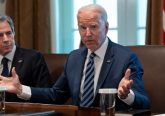 Following the party conventions the past two weeks has brought to mind a book often discussed in historiography seminars at Oxford’s Rothermere American Institute: Lee Benson’s The Concept of Jacksonian Democracy, written in 1961. In this classic work, Benson argued that voting behaviour in the Jacksonian period was determined not by ideology or class, but rather by ethno-cultural factors such as ethnicity, religion and community association. Does Benson’s argument have any relevance in 2012?
Following the party conventions the past two weeks has brought to mind a book often discussed in historiography seminars at Oxford’s Rothermere American Institute: Lee Benson’s The Concept of Jacksonian Democracy, written in 1961. In this classic work, Benson argued that voting behaviour in the Jacksonian period was determined not by ideology or class, but rather by ethno-cultural factors such as ethnicity, religion and community association. Does Benson’s argument have any relevance in 2012?
Any observer who watched the shots of the delegates in the convention halls saw the obvious way that Benson’s thesis pertains to today’s politics. African Americans, who were so much more visible in Charlotte than Tampa, are almost uniform in their support for Obama. Latinos are gravitating in that direction; though certain groups, such as Florida’s Cuban Americans (led by Marco Rubio), remain Republican. Evangelicals lean the Republican. And so on.
Many social groups do not vote in homogenous blocks, as Benson was well aware. Evangelicals, for instance, were central to both Whigs and Democrats in the nineteenth-century. But to have value today, Benson’s argument needs to be advanced with a new twist: identities are not a given; they are constructed through social processes – processes which also condition voting behaviour.
This thesis is worth considering after two remarkably similar conventions. Republicans and Democrats used similar keywords; they advanced similar narratives concerning their candidates; they even used similar tactics when attacking one another (e.g. ‘my opponent is a nice guy who means well, but he is pursuing the wrong policies’). The speeches of Romney and Obama mirrored each other in another way: they were both surprisingly vague when it came to specific policy proposals. Close political observers, of course, know the differences between the parties and the candidates. But was there enough substance in either speech to sway the average undecided voter in a swing state?
Which brings us back to Benson. Race and ethnicity clearly remain important determinants of voting, as it was in the period he examined. But 2012 is not 1844. Many ethnic identities have weakened since the nineteenth century, particularly among whites, who are less likely now to think of themselves as part of a hyphenated group (Irish-Americans, Italian-Americans, etc.). Yet the power of negative self-referencing – that is, seeing oneself in opposition to another social group – remains strong. Furthermore, other forms of identity, empowered by the clustering of social groups brought on by suburbanization, appear to have filled the void – civic societies, churches, even allegiances to sports teams.
Rather than reflecting voting patterns and party affiliations, these social formations may be driving them. Using the prism of Benson, let’s return to return to our hypothetical swing voter: the political preference of his family, church, or golf club will matter most in determining his vote.
It is revealing that the Obama team has identified independent college educated men in their 20s and 30s as the keyswing constituency. This demographic is also likely to be disproportionately comprised of ‘lone-wolfs’ in a communal/social, as well as political, regard. If Benson’s thesis holds in 2012, the votes of this constituency will be shaped not by convention speeches, but by the social groups these men affiliate with.
Jay Sexton is a Lecturer in American History at Oxford University and Fellow at Corpus Christi College.
This post is part of Elections 2012 a collaborative project between the Rothermere American Institute and the Departments of Politics at Oxford and Cambridge Universities.







No Comment